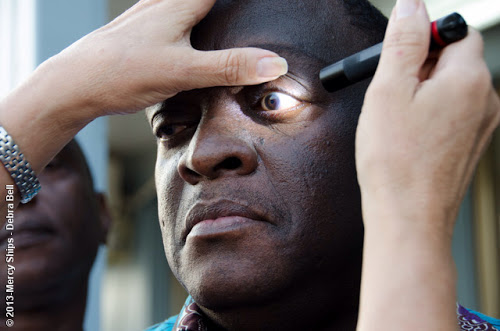Recognizing the Different Vision Modification Procedures Available for Clearer View
In the world of vision improvement procedures, a wide variety of alternatives exist to address refractive errors and offer individuals with more clear view. From the widely identified LASIK surgical procedure to much less invasive treatments like PRK and implantable lenses, the area of ophthalmology uses a variety of techniques customized to match different demands and preferences. Each procedure includes its very own set of factors to consider, benefits, and possible dangers. Comprehending the subtleties of these vision adjustment approaches is vital for making informed decisions concerning one's visual wellness. Let's check out the details of these procedures and clarified the course to achieving enhanced vision quality.
LASIK Surgical Treatment
LASIK surgical treatment is a common refractive treatment made use of to deal with vision troubles such as farsightedness, astigmatism, and nearsightedness. This surgical technique, which stands for Laser-Assisted in Situ Keratomileusis, aims to reshape the cornea to enhance how light is concentrated on the retina, inevitably improving vision clarity.
One of the main advantages of LASIK surgical treatment is the fast enhancement in vision experienced by individuals. In general, LASIK surgery is a preferred option for people seeking a long-term option for their vision troubles.
PRK Treatment

PRK is a suitable option for individuals with thin corneas or those at a greater threat of eye injuries, as it does not include producing a corneal flap. The healing procedure for PRK is a little longer contrasted to LASIK, as the epithelium requires time to regenerate. Patients may experience pain and fuzzy vision for a couple of days following the procedure.
Regardless of the longer healing time, PRK can generate superb cause vision renovation, making it a beneficial alternative for those who might not appropriate candidates for LASIK surgery. - Cardiologist Andalusia
Implantable Lenses
As opposed to PRK where the cornea is improved directly, implantable lenses use an additional approach for correcting vision by placing synthetic lenses inside the eye. This procedure is specifically helpful for people with high levels of farsightedness, nearsightedness, or astigmatism that may not be appropriate candidates for laser surgical procedures like LASIK or PRK.
Implantable lenses, also called phakic intraocular lenses, work by supplementing the eye's all-natural lens with an artificial one. These lenses can be put before the natural lens (former chamber) or behind the iris and in front of the natural lens (posterior chamber) By changing the power and positioning of these lenses, ophthalmologists can efficiently deal with refractive errors and boost visual skill.
One advantage of implantable lenses is that they are removable and exchangeable, offering flexibility for future changes. As with any type of medical procedure, there are dangers involved, such as infection or cataract formation. Patients considering implantable lenses need to talk to an eye treatment expert to figure out the most suitable choice based upon their specific needs and eye health and wellness.
Corneal Rings

The procedure for placing corneal rings is reasonably quick and minimally invasive, frequently performed as an outpatient procedure. Throughout the surgical treatment, the ophthalmologist makes a tiny laceration in the cornea and inserts the rings at a specific depth. When in position, the rings assist to improve the cornea, giving a smoother surface area for light to go into the eye, which can cause more clear vision.
Corneal rings are taken into consideration a relatively easy to fix procedure, as they can be removed or replaced if required. While they may not completely remove the need for glasses or call lenses, corneal rings can significantly boost vision top quality and total visual convenience for individuals with keratoconus or various other corneal irregularities.
Refractive Lens Exchange
Adhering to the improvement of corneal irregularities with procedures like corneal rings, another vision correction method that can deal with refractive errors is Refractive Lens Exchange (RLE) RLE is a surgery that includes changing the eye's all-natural lens with a man-made intraocular lens (IOL) to fix refractive mistakes such as presbyopia, nearsightedness, and farsightedness. This treatment is especially beneficial for people that may not appropriate prospects for procedures like LASIK or PRK because of variables such as thin corneas or high refractive errors.
RLE is comparable to cataract surgery, as both entail removing the eye's all-natural lens; however, in RLE, the lens is clear, not over cast as in cataracts. The fabricated lens implanted throughout RLE can be tailored to resolve the person's particular refractive error, offering clear vision at different ranges. Healing time for RLE is fairly fast, and clients can anticipate enhanced vision not long after the procedure. Similar to any kind of surgery, prospective threats and problems exist, so an extensive appointment with an eye care professional is vital to establish if RLE is the right vision adjustment choice.
Conclusion

In the realm of vision correction treatments, a multitude of alternatives exist to deal with refractive mistakes and offer individuals with more clear sight.LASIK surgical procedure is a typical refractive treatment used to deal with vision problems such as nearsightedness, astigmatism, and farsightedness.While additionally a typical refractive treatment, the PRK (Photorefractive Keratectomy) technique varies from LASIK surgery in its strategy to fixing vision issues.Following the improvement of corneal irregularities with treatments like corneal rings, another vision improvement technique that can attend to refractive mistakes is Refractive Lens Exchange (RLE) LASIK surgical treatment, PRK procedure, implantable lenses, corneal rings, and refractive lens exchange are all choices that can resolve different vision issues.
Comments on “Discover the most effective Eye Center Andalusia: Advanced Vision Solutions”